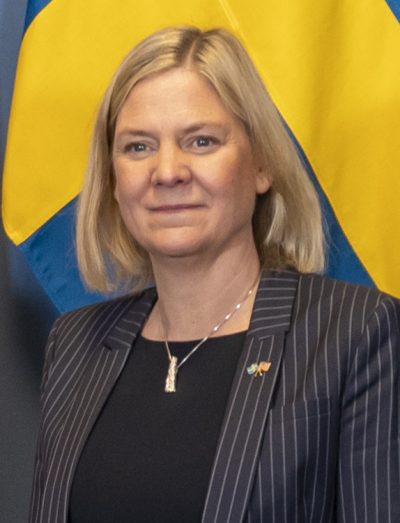Swedish PM Resigns After Right-wing Bloc Wins General Election

The Swedish Prime Minister, the Social Democrat Magdalena Andersson, announced her resignation following her party’s defeat in the recent general election to select the 349 members of the Riksdag, the national parliament of Sweden. It is evident that ultra-conservatism is gaining more strength in Europe. The final result of the elections left the centre-left bloc with three seats less than those obtained by the conservative group, made up of three right-wing parties and one far-right party.
With 20% of the vote, the second most popular political force was the far-right Sweden Democrats (DS), which describes itself as ultra-conservative and nationalist. Their proposals and speeches commune with anti-immigrant ideas —especially against Muslims— and Eurosceptic thoughts. This is the polar opposite to the Social Democrats, which has pushed Sweden to NATO and welcomes open border ideals.
Since 2005, Jimmie Akesson has been the leader of DS. The 43-year-old in the last fifteen years has moderated the narrative of his party, which has a direct legacy from the neo-Nazi group Bevara Sverige Svensk. One of his tasks was to end neo-Nazi speeches and, instead, focus on anti-migration policies.
Given the advance of the extreme right, Magdalena Andersson has preferred to resign her mandate after losing the legislative majority as it is now virtually impossible for any of her policies to be approved.
“So tomorrow [September 15] I will request to resign from my duties as prime minister and, after that, the responsibility will fall on the president of Parliament,” said Andersson, who has held the highest position in the Nordic country since November 30, 2021.
One of the strongest criticisms against the DS is that its transformations has only been superficial and cosmetic, since, beyond seeking a more open and contemporary ideology, the party only seeks a bit of political correctness to attract more voters. None-the-less, Akesson expelled known neo-Nazi figures from the party and changed the logo. Instead of a torch with a Swedish flag – a symbol alluding to various neo-Nazi movements in Europe – he placed a blue and yellow flower. In addition, his carefree appearance, exempt from formalities, positioned him as an atypical leader, far removed from the stereotype of the traditional European right-winger.
Despite this, data from Acta Publica, whose head office is located next to the Stockholm Central Mosque, believes that at least 214 candidates from DS for legislative and regional positions have or had direct or indirect links with neo-Nazi organisations. Political extremism today is an unquestionable reality in the Nordic countries. Many Swedes are fed up with migrant groups refusing to integrate and are also disproportionately committing crimes compared to the general Swedish population.
Although the DS’ position on migration is known, it does raise the question on their foreign policy outlook.
Last August, the new Defence Minister of nearby Estonia, Hanno Pevkur, made a statement that intensified tensions in Eastern Europe, and more alarmingly, was said at a time when Russia and Ukraine are in a geopolitical conflict, whose consequences have been felt around the world. Pevkur assured that one of his immediate plans is to use the Baltic Sea as a strategic space to benefit NATO. And for this, he said, the role of Sweden and Finland will be fundamental.
“The Baltic Sea will be NATO’s internal sea once Finland and Sweden have joined it. The situation will change compared to the current one,” said the head of the Estonian Defence Ministry in an interview with the local media Iltalehti.
Days before Pevkur’s declaration, US President Joe Biden signed the ratification of admission for both Scandinavian countries to become NATO members. However, the election of DS has the potential to ruin all the plans NATO and the EU concocted for Sweden.
“When you are holding on to power with one seat, it’s a cause of instability,” said Eric Adamson, a Stockholm-based project manager at the Atlantic Council’s northern Europe office. “This may make it harder for Sweden to take on a leadership role in northern Europe, in the E.U. or in NATO.”
Although the SD were once sceptical toward NATO membership, the majority of the party are now in favour. Despite this, with Sweden chairing the EU presidency during the first six months of 2023, they may set up roadblocks toward greater EU cooperation at a time when all efforts are being made to economically cripple and isolate Russia.
*
Note to readers: Please click the share buttons above or below. Follow us on Instagram and Twitter and subscribe to our Telegram Channel. Feel free to repost and share widely Global Research articles.
Ahmed Adel is a Cairo-based geopolitics and political economy researcher.
Featured image is by the U.S. Department of State, licensed under the Public Domain
This article has been archived for your research. The original version from Global Research can be found here.

